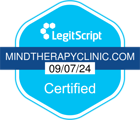Anxiety, depression and other behaviors often overlaps with addiction.
People who are struggling with addiction often experience anxiety, depression, and delusions. This is called a co-occurring disorder and it recognizes that substance use is often driven by underlying mental disorders.The term dual diagnosis also indicates that someone is struggling with both mental illness and substance use.
Mind Therapy clinicians who work in addiction treatment are also experienced in the treatment of co-occurring mental health disorders. These addiction specialists consider both your dependence and your mental illness as you go through the recovery process. Recovery blends the most successful aspects of mental health care and substance abuse treatment. Instead of drawing a hard line between psychiatric health and addiction, these areas are treated as part of a continuum.
To increase the chances of achieving a full recovery, your care includes:
Parallel treatment of your mental health and substance use disorders by the members of a highly trained treatment team
Psychotherapeutic medications, such as antidepressants or anti-anxiety
A supportive approach to therapy that reinforces self-esteem and builds self-confidence
An inclusive treatment strategy that brings partners, spouses, children and other household members into therapy for individual counseling, group meetings or education
Each clinical plan evolves over the course of the treatment and is revised based on progress to ensure optimum result. The plan may include:
Medications targeting dependence such as Suboxone® and Vivitrol®
Medications targeting psychiatric symptoms
Family system intervention, assessment, and referral services
Individual psychotherapy and counseling
Family therapy
Suboxone & Vivitrol treatment
Suboxone
Suboxone is effective new treatment options for addiction to heroin and prescription narcotic painkillers such as Oxycontin and Vicodinare. Suboxone is a "partial opiate," meaning that it gives the brain something like what it is used to without the dangers associated with "full opiates" such as Heroin, Vicodin, or Methadone. It provides longer-lasting relief and reduce the reliance on daily medication dosages
Vivitrol Injections
Another new treatment option for addiction to heroin, morphine and opiate painkillers that was recently approved by the FDA consists of monthly injections of a drug called Vivitrol. This drug, known generically as naltrexone, works on the body differently than methadone or buprenorphine. It actually blocks the effects of opioid drugs and reduces the craving to take them.
Mind Therapy Clinic Recovery Group Therapy
Anxiety Group Therapy
Balanced Living Group
Cognitive Behavioral Therapy
Coping with Triggers Group
Depression and Loss Group
Distress Tolerance Group
Emotion Regulation Skills
Emotions and Compulsions
Family and Relationship Issues Group
Goals Group
Healthy Living
Men’s Psychotherapy Group
Self-Compassion Group
Stress and Addiction Group
Taking Charge Group
The Next Right Thing Group
Women’s Psychotherapy Group
Programs for Addiction Recovery
Intensive Outpatient Program
Partial Hospitalization Program
Insurance information
Does my health insurance cover treatment for dual disorder?


